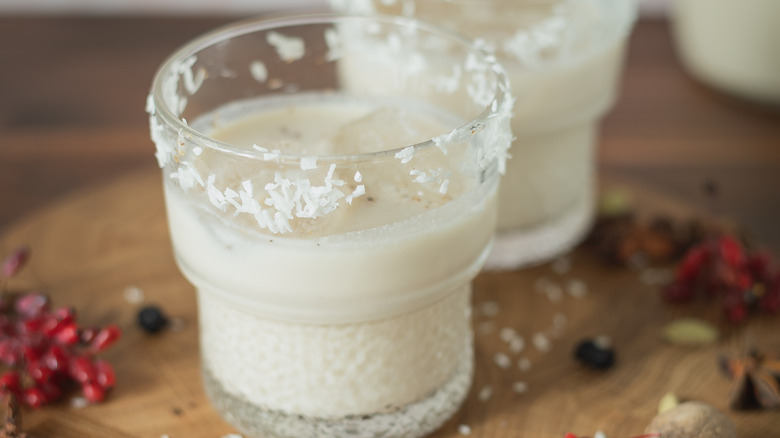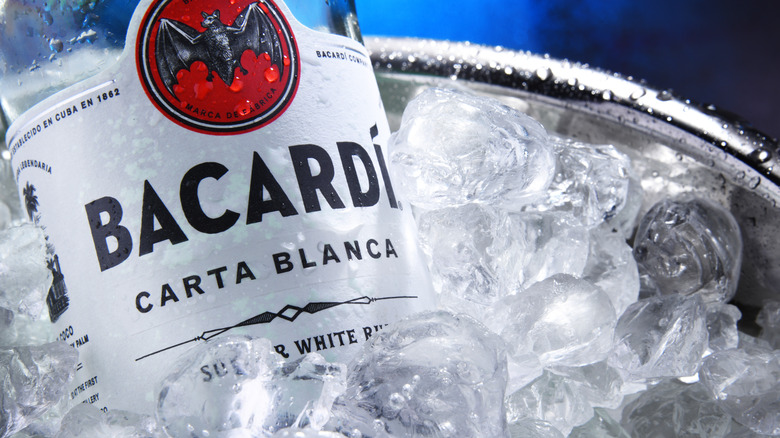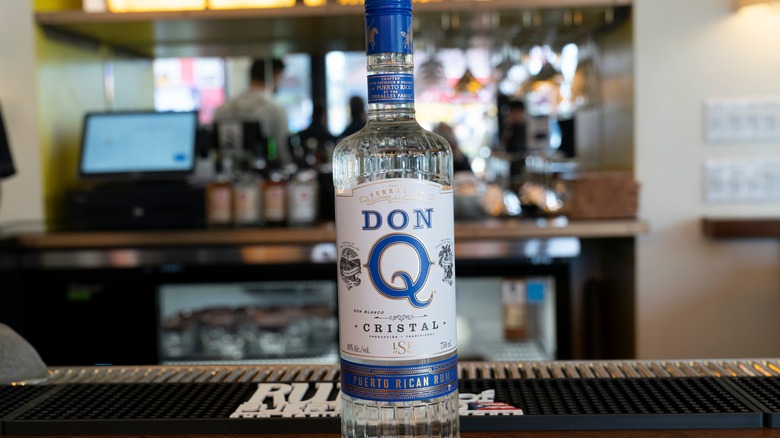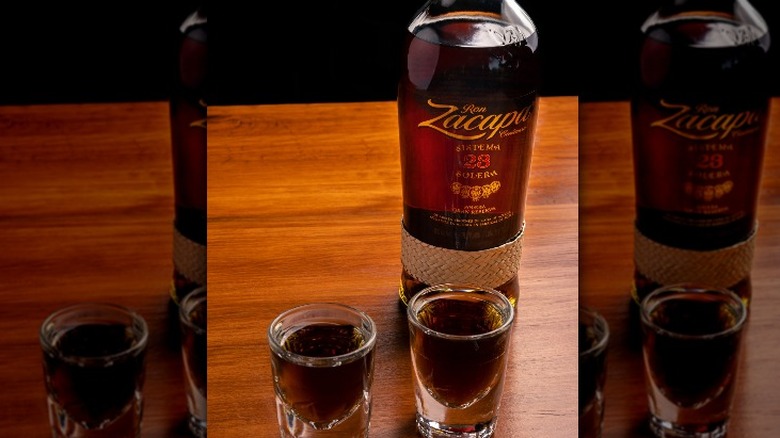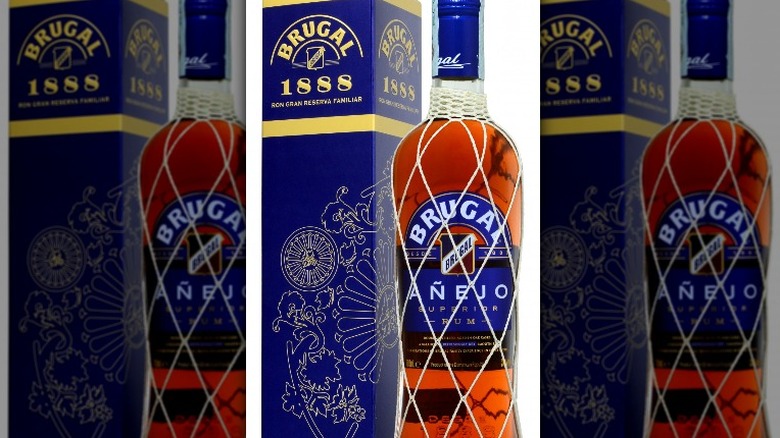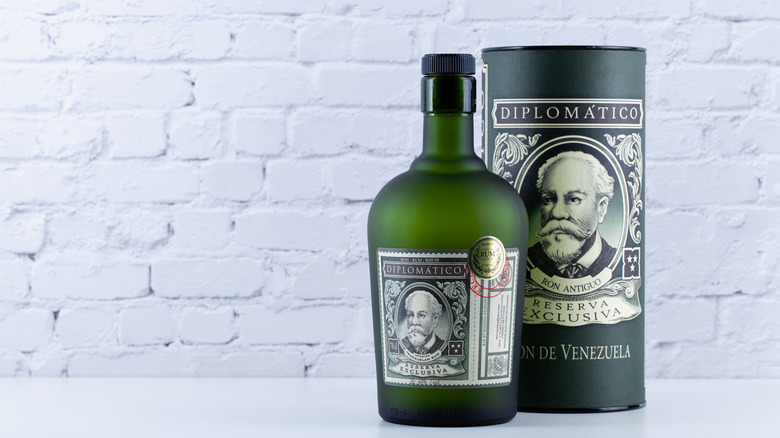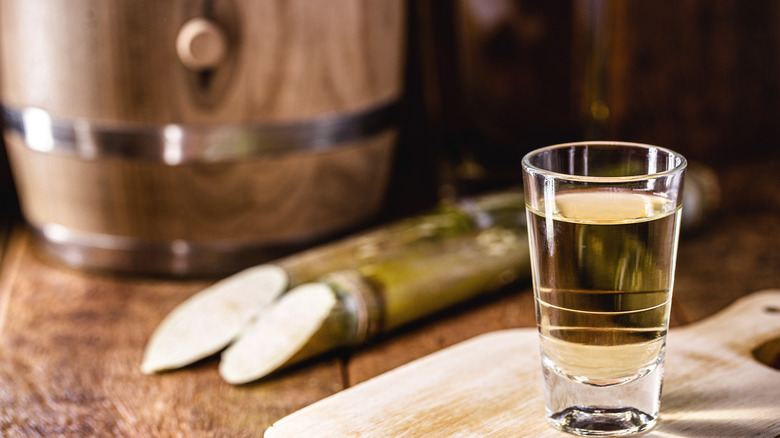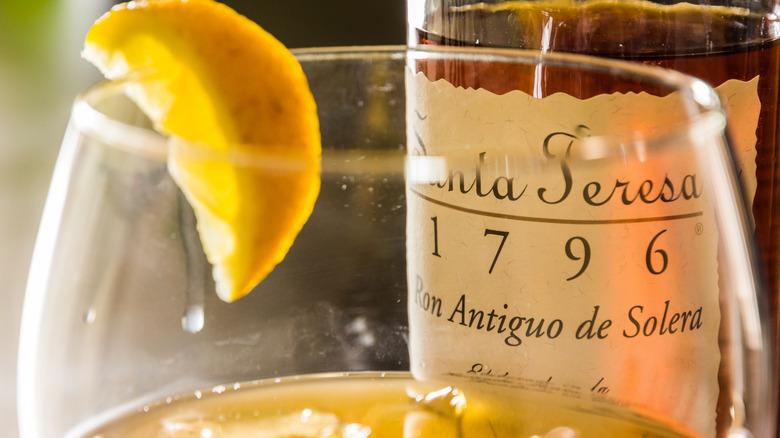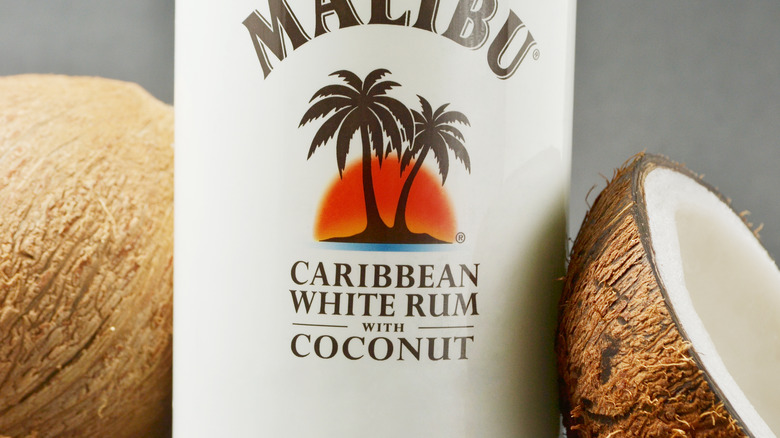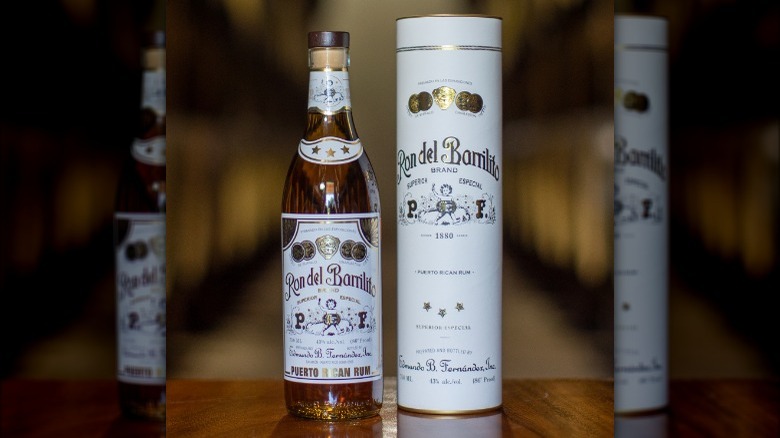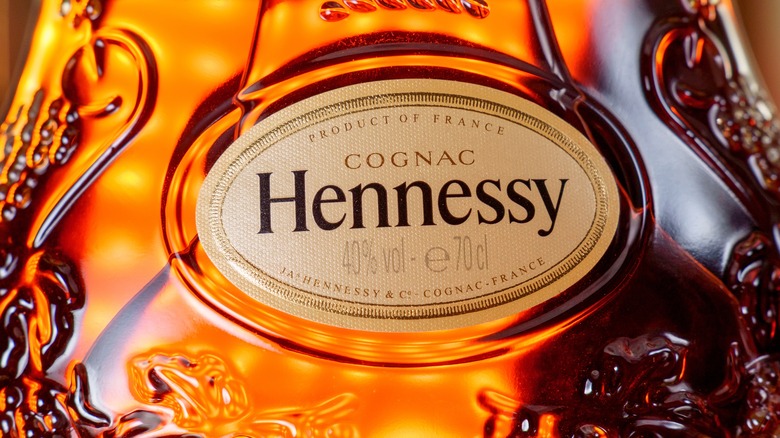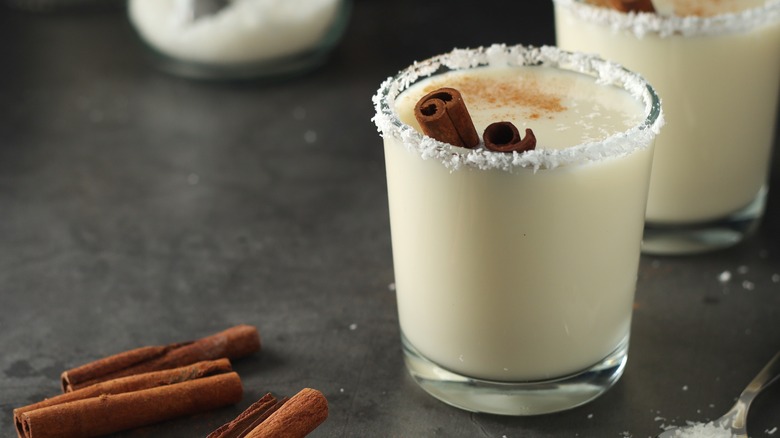10 Best Rums For A Coquito
If you identify as Puerto Rican (or are close to anyone who does), coquito might bring back memories of holiday celebrations that may or may not have resulted in a holly jolly hangover. Coquito is typically compared to egg nog, but with a tropical twist. The drink is a blend of various kinds of milk, coconut, cinnamon, and rum that's meant to be sipped during the holiday season.
There's really no wrong way to make the spirit — people get creative by adding different flavors or spirits to their recipe. Some rums, though, are tried-and-true picks for the cocktail.
We spoke with a couple of rum experts to select the best rums/spirits for coquito and hopefully get you inspired to make a bottle this holiday season. Christopher Reyes is an experienced bartender of Puerto Rican descent who jokes that he "grew up" drinking coquito. He also owns Aldama and Ponyboy, two Brooklyn eateries known for their cocktail list. We also talked to Chris Andrasfay, the co-founder of Frankie's Tiki Room in Las Vegas, who boasts quite an impressive rum background.
Bacardi Superior
Bacardi is one of the most popular spirits in America and is commonly used for coquito because it's easy to find and cheap to buy. Reyes says he loves to support local coquito makers in New York during the holiday season, and most of the producers use Bacardi carta blanca, or white rum, in their recipes. "Growing up, they would use the cheapest rum they could find as long as it was light rum like Bacardi," Reyes explained.
Bacardi is the quintessential "Puerto Rican" rum, but Reyes points out that the majority of bottles imported to the U.S. are produced in Mexico. Therefore, he doesn't believe that coquito has to be made with rum that comes from Puerto Rico, especially since most bottles of Bacardi do not. However, it still makes it one of the easiest rums to use, especially if you're making coquito for the first time.
Don Q
Another Puerto Rican rum that is easy to get your hands on is Don Q Cristal. Reyes doubles down on the idea that coquito isn't supposed to be something fancy and overly thought out, so using an affordable rum is the simplest way to make it. "Coquito is a drink that's supposed to be affordable. You can buy it for the holidays with $20 or $30 and bring it to your dinner party with your family," he explained. "It's about having fun when you make it. It's not supposed to be so sophisticated."
It makes sense to use something like Don Q, which sells for less than $22.49 on Drizly (as of December 2023). It's another clear carta blanca rum that won't strongly impact the drink's flavor but provides it with the necessary booze to make it real coquito. It's a good pick that's close to Bacardi, but a little bit different if you're tired of the typical recipe.
Rum Zacapa
White rum is the standard for coquito, but Reyes' favorite kind to use is a rum that has been distilled using the Solera system, which is essentially a particular method of aging. In general, an aged rum will elevate the flavors of vanilla, cinnamon, and oak in the coquito rather than just providing the drink with a boozy edge. "Aged rum, since it's in barrels, will give it that extra spice level," Reyes said. "It's just going to bump up the flavors of what you're already making."
In general, Solera system rums are darker in hue, have a richer mouth feel, and add a kick of sweetness along with complexity to the coquito. Rum Zacapa is a particular favorite for Reyes, who is also of Guatemalan descent — the rum's home country. "I've had it many times with aged rum, probably a lot more than you would think," Reyes added.
Brugal Añejo
Another aged rum that Reyes recommends for coquito is Brugal Añejo, which is native to the Dominican Republic. Sold at the price point of $47.49 a bottle on Drizly (as of December 2023), Brugal Añejo is characterized by sweet notes of caramel, brown sugar, and toffee that, alongside notes of vanilla and clove, channels the flavor of fresh baked goods. Coquito is a sweet treat that's meant to be savored — it's not a good idea to down a whole bottle in one night by yourself unless you're asking for a stomachache. Therefore, Brugal increases the sweetness of the drink, making it even more of an indulgence while opening up the drink to sophisticated oaky notes.
Brugal makes a few iterations of rum, including a blanco supremo, if you want to keep things traditional. If you're feeling adventurous, try making coquito with a bottle of añejo and see if it lives up to (or even outshines) the original recipe.
Ron Diplomatico
If you're looking for something a little fancier, Venezuela's Diplomatico rum is a rich addition to your holiday coquito — one that's especially enjoyed after a traditional Puerto Rican feast. The holidays are about giving, celebrating, and enjoying each other's company, so some coquito with a premiere rum can be a fun way to epitomize that. "In general, when it's the holiday season, it automatically turns into coquito season," Reyes said. "You never show up to anybody's house, especially if they're Puerto Rican or Spanish-speaking Caribbean people, without some coquito."
Diplomatico has been distilling several types of rum for decades. As for which to use in coquito, it depends on personal preference. If you prefer to use a clear rum and let the other flavors shine through, try Diplomatico Planas, which sells for $35.99 on Drizly (as of December 2023). If you want something aged and a bit more interesting, Diplomatico Rum Reserva Exclusiva can mix things up. It will cost you $44.90 a bottle on Drizly, but it will result in a coquito that tastes like none other.
Cachaça
Cachaça is a Brazilian spirit distilled from sugarcane that is recognized as another version of rum in America. Rum is usually distilled from molasses; however, cachaça is distilled from fermented sugarcane juice. It's that small difference that can totally change the outcome of your coquito — if you're feeling adventurous. Reyes says it's common for people to make coquito using cachaça or Clairin rum from Haiti, which he says adds a little funk to the recipe.
"There are so many options of rum throughout the world," Reyes said. It's why he encourages people to branch out in the liquor aisle, as a coquito made with Brazilian cachaça feels like a totally different beverage than coquito made with Bacardi or Don Q. If you're looking for something unfamiliar, it pays to get creative. Is it necessary to go and hunt down rare rums in order to make coquito at home? Absolutely not. "There's no problem whatsoever with making coquito with just regular, carta blanca rum," Reyes adds.
Santa Teresa 1796
While Rum Santa Teresa 1796 is part of the Bacardi family, it's a Venezuelan rum that stands out from the sea of carta blancas. It's another solid example of a Solera system rum that is aged to perfection and can completely transform your coquito recipe into something fit for a cocktail bar. As previously mentioned, Reyes isn't hung up on using just Puerto Rican rums — especially considering the massive global production of Bacardi outside the island. "I use Guatemalan rum or Venezuelan rum. I rarely use Puerto Rican rum," Reyes said.
Rum Santa Teresa 1796 is a bit more expensive — you can find a bottle selling for $49.99 on Drizly as of December 2023. So it's far from the most budget-friendly option, but it is one ingredient you can't go wrong with in terms of coquito. Especially if you find yourself with a bottle that you'd prefer not to drink on the rocks.
Malibu
While it would be a bit overwhelming to use solely Malibu or another coconut rum in coquito, Reyes believes it can amp up the coconut flavor if you mix it in with carta blanca or other rums. It's not an ingredient he necessarily requires in order to accomplish a coquito recipe. "If I had coconut rum I would add it," he said. Malibu is also extremely affordable, so it fits with the ethos of coquito being an approachable spirit everyone can enjoy during the holidays.
In general, Reyes recommends that novice coquito makers take their time and taste their recipe along the way. "You can always add to something, but you can never take it out. Just go slow and take it little by little," he said. He also recommends using fresh ingredients, like making your own simple syrup and using vanilla bean pods instead of extract, to make your coquito the best it can be.
Barrilito 3 Star
Frankie's Tiki Room doesn't serve coquito, but the Las Vegas restaurant's impressive cocktail menu is filled with interesting recipes that know how to get creative with a variety of rums. Andrasfay is of the belief that coquito should be made with Puerto Rican rum whenever possible, but that doesn't mean you have to stick with Bacardi or the mainstream options. "The only thing I can tell you is that the Barrilito 3 Star would be the best Puerto Rican Rum to use, just looking at the flavor profile of the ingredients," Andrasfay said.
Ron del Barrilito 3 Star is another dark and rich-aged rum with notes of molasses, oak, and even a bit of smoke. Bottles sell for the reasonable price of $34.99 on Total Wine and will add a depth to coquito that can't be replicated by solely adding spices to the recipe.
Hennessy
We know that Hennessy isn't in the rum family — it's a strong cognac popular both on the rocks and in expressive cocktails. However, coquito is supposed to be low-stress and fun, as Reyes explained, so it's okay to break the rules a bit. Reyes says it's common for him to see coquito made using Hennessy in New York (and beyond) during the holiday season to add some variety to all of the offerings. "It's actually really, really, really good," he admitted.
It's not for the faint of heart — a coquito recipe using Hennessy will definitely be stronger than a version with rum. Another coquito tip from Reyes is that no matter what alcohol you're using, you should let your finished beverage sit overnight in the fridge before enjoying it. That way, all the flavors can marinate. "It's going to taste way better in the morning, better than candy," he promises.
Methodology
Commentary from industry experts interviewed by Tasting Table provided the basis for the rankings, opinions, and quotes in this article. Flavor, taste, and value were the primary focus of these rankings, all centered on how well these rums blend in a coquito.
